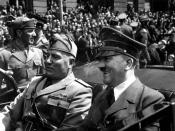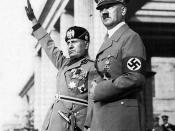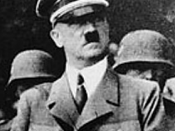Like most nations of Europe in the mid 1930's, Germany was suffering from the consequences of the Great Depression. During this period of economic and political diffculty, the country had become more susceptible to extreme political parties promising solutions to the problems which faced the country. The Nazi Party, led by Adolf Hitler, was one such group, and came to power in 1933 with the promise of making Germany great once more. Propaganda was used intensively by the Nazis as a means of achieving power in 1933, and again was the main method of tightening their hold on power. Propaganda was an inescapable part of life in Germany under Nazi rule - the press, the radio, literature, theatre, film and other forms of art and culture hammered the message, sometimes crudely and sometime subtly (Walsh, p.2). The Nazi propaganda of the 1930s was an instrumental part of persuading the German people to believe in Nazi doctrine and its foundation issue of loyalty to the state.
Hitler and the Nazi party consolidated their hold on Germany (1933-36) by instilling fear in the German people, as well as preying on existing fears, and achieving surrender of individual rights through an intensive propaganda campaign.
Germany under Hitler was a society with little personal choice, and few individual rights. Only in this way could Hitler be sure that his power would not come under threat. Suppression of individual rights and liberties could be seen in a number of ways, and is illustrated in White & Hadley's Germany 1918-1945 (see appendix 1). This illustration shows Hitler and his subordinates standing on a platform which is supported by bound and gagged German people, each representing religious freedom, academic freedom, labour and trade unions, and freedom of the press. This illustration, featured in American newspaper The...



Hitler
hitler was a political genius in himself, although cruel and sinsister. you have expressed a clear and concise point, well done
2 out of 2 people found this comment useful.